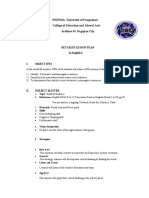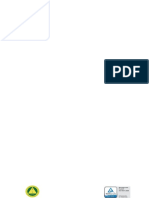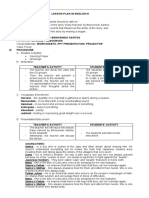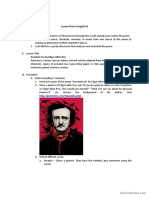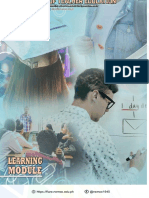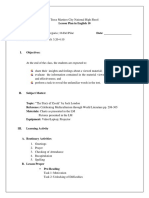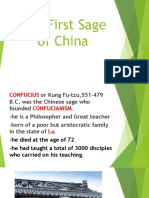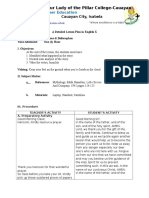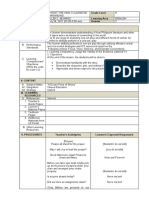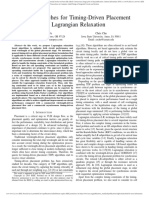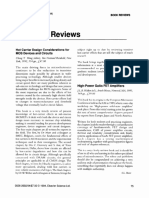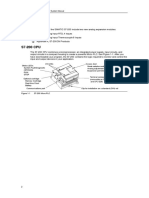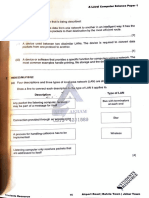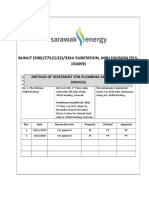Final Grammar LP
Final Grammar LP
Uploaded by
Rosielyn ParagasCopyright:
Available Formats
Final Grammar LP
Final Grammar LP
Uploaded by
Rosielyn ParagasOriginal Description:
Original Title
Copyright
Available Formats
Share this document
Did you find this document useful?
Is this content inappropriate?
Copyright:
Available Formats
Final Grammar LP
Final Grammar LP
Uploaded by
Rosielyn ParagasCopyright:
Available Formats
A Detailed Lesson Plan in English
Grade 10
I. Objectives
At the end of the lesson, students should be able to:
A. Describe what an adjective clause is.
B. Compose sentences with adjective clauses.
C. Combine two sentences by transforming one into an adjective clause.
D. Locate adjective clauses in sentences.
II. Subject Matter
A. Language Form:
Adjective Clause
B. Language Function:
Describing nouns and pronouns.
Reference:
English Grammar and Composition, pages 54-58,312-315.
III. Materials
Power Point Presentation and chart
IV. Procedure
Teacher’s Activity Students’ Activity
A. Presentation
I am going to group you into two. What
you are going to do is to complete the thought
of the given paragraph by choosing the most
appropriate word for each blank.
After Caroline died, Francis Answers:
1.______sister had arrived to help seemed 1. Whose
to go about in a trance. This sister 2. Who
2.______was named Irene did her best to 3. Which
perform the duties 3._______Caroline had 4. Who
carried out; however, Francis 5. Where
4._______scarcely noticed her acted like a 6. Who
ghost and went to his laboratory 5. 7. Which
_______he isolated himself. Irene 8. Who
6.______rarely saw him began to worry. 9. Which
When Francis did come to dinner, he was 10. which
quiet and distant 7._______scared the
children. One day, Zaphanie was crying
miserably, so Diana 8.______was
unnoticed by Francis took her to her own
laboratory to amuse her. The following day
9.________was a Saturday Diana took
Zaphanie for a walk in a park
10.______was nearby.
Okay, Now that we completed the
paragraph, I want you look at it closely. Look
at the underlined parts of the paragraph. Do
they make sense if we are going to deal with No
them one by one?
Yes, very good. They don’t make sense
on their own but when used in sentences they
mean something. They need other set of words
to function.
Since they don’t make sense it means Clauses/Dependent clauses
that they are not sentences, what do we call
them then? Sometimes, these clauses are also
called subordinate clauses and they
What are dependent clauses, again? don’t have a complete thought.
One of the functions of these dependent
clauses is to act as an adjective in a sentence.
In this case they are called “Adjective
Clauses”. They are used to modify the noun.
Irene did her best to perform the duties
which Caroline had carried out.
In this example, the adjective clause modifies
or describes the noun “duties”
B. Analysis
Okay, let’s have these adjective clauses.
1. whose sister had arrived to help
2. who was named Irene
3. which Caroline had carried out
4. who scarcely noticed her
5. where he isolated himself
6. who rarely saw him
7. which scared the children
8. who was unnoticed by Francis
9. which was a Saturday They begin with pronouns.
10. which was nearby
How are the adjective clauses above
written? Whose, who, which, and where
Very good! They begin with pronouns. Interrogative pronoun
What are the pronouns used?
And what do we call these pronouns?
No
Yes, whose, who, which and where are
called interrogative pronouns when they are
used in sentences in interrogative form but are
these pronouns used in the paragraph to ask
questions?
In this case, they are called “relative
pronouns”. The reason why adjective clauses
may also be called relative clauses.
Aside from relative pronouns, adjective
clauses may also begin with a relative adverb
such as “where”. Relative Pronoun
Let’s have the first adjective phrase.
Subject
whose sister had arrived to help
“Whose” is an example of what? had
How about The word “sister”, how Verb, specifically a be-verb.
does it function?
What word follows?
What part of speech is had?
Yes, very good! And it is followed by
the word arrived which is an action
verb. Relative Pronoun
How about this one:
which scared the children Verb
“Which” is an example of what?
If “which” is a relative pronoun in this
adjective clause “scared” is what?
Very good! As you can see the first one
is composed of a Relative pronoun+ Subject+
Verb while on the second one, there are only
Relative pronoun + verb.
That is because the relative pronoun
“which” on the second adjective clause
functions as the subject.
Now, let’s have this sentence:
Yes
After Caroline died, Francis whose
sister had arrived to help seemed to go
about in a trance.
Look at this sentence. Can we remove the
adjective clause without affecting the thought
of the sentence?
Yes, we can. This type of adjective clause
is called “Non restrictive adjective clause”.
If a nonrestrictive adjective clause is
removed from a sentence, the meaning of the
No
main clause does not change.
How about this one:
Because it will affect the thought of the
Irene did her best to perform the duties sentence.
which Caroline had carried out.
Can we remove the adjective clause?
Yes and this type of adjective clause is called
“restrictive adjective clause”.
If a restrictive adjective clause is removed
from a sentence, the meaning of the main
clause changes.
C. Generalization
ADJECTIVE CLAUSE
It is dependent clause that functions as
an adjective in the sentence.
It can also be called relative clause or
adjectival.
It begins with a relative pronoun or a
relative adverb.
List of Relative Pronouns:
Who-- used for humans in the
subject position
Whom-- used for humans in the
object position
Which-- used for things and
animals in the subject or object
position
That-- used for humans,
animals and things, in the
subject or object position
Whose-- used for humans,
animals and things in the
subject or object position to
show possession
List of Relative Adverbs:
When- Refers to a time (in +
year, in + month, on + day,...).
Where- Refers to a place (in +
country, in + city, at +
school,...).
Why- Refers to reason
It always contains both a subject and a
verb:
Relative Pronoun or Adverb +
Subject + Verb
Relative Pronoun as Subject +
Verb
It has two main types:
RESTRICTIVE ADJECTIVE
CLAUSE
It contains information
that is necessary to
identify the noun it
modifies.
is not separated from the
main clause by a comma
or commas.
* If a restrictive adjective clause
is removed from a sentence, the
meaning of the main clause
changes.
NONRESTRICTIVE ADJECTIVE
CLAUSE
It gives additional
information about the
noun it modifies but is
not necessary to identify
that noun.
This type of clause is
separated from the main
clause by a comma or
commas.
The relative pronoun
“that” cannot be used in
this type adjective
clause.
* If a nonrestrictive adjective
clause is removed from a
sentence, the meaning of the
main clause does not change.
D. Activities
ACTIVITY 1 1. The woman who sits next to me in class
works as a cashier.
Combine two sentences together to make one 2. That's the book that everyone is
sentence. Put the adjective clause after the reading.
noun that it modifies. 3. My neighbor whose tenants play drums
loudly until midnight complains about
Example: my stereo.
4. It's nothing that you need to worry
The student is a very nice person. / She about.
comes from Japan. 5. I couldn't remember anything that I
saw.
Answer:
The student who comes from Japan is a
very nice person.
1. The woman works as a cashier. She sits 1. who listens to his men modifies leader
next to me in class.
2. That's the book. Everyone is reading it. 2. which I loved dearly modifies dog
3. My neighbor complains about my
stereo. His tenants play drums loudly
until midnight. 3. who takes responsibility well modifies
4. It's nothing. You don't need to worry person
about it.
5. I saw it. I couldn't remember anything. 4. who purchased tickets modifies individual;
5. that you bought me modifies shirt
ACTIVITY 2
6. who baked the winning pie modifies woman
Find the adjective clause in the following
sentences and tell which word it modifies. 7. when I was unable to answer modifies time
1. I like a leader who listens to his men. 8. for whom you are looking modifies one
2. The dog which I loved dearly was hit by a
truck last night. 9. who are willing to serve others modifies
those
3. Rulon is a person who takes responsibility
well. 10. to whom much is given modifies one
4. All individuals who purchased tickets will
be admitted.
5. The shirt that you bought me doesn't fit well.
6. The woman who baked the winning pie is
my wife.
7. You called at a time when I was unable to
answer.
8. Gayle is the one for whom you are looking.
9. Those who are willing to serve others will
be rewarded.
10. One to whom much is given is expected to
give much in return.
You might also like
- Samsonite Dealer Catalogue 2010Document100 pagesSamsonite Dealer Catalogue 2010gigi_shmen0% (1)
- Grade 7Document13 pagesGrade 7Mark Cesar VillanuevaNo ratings yet
- Big Data Camp Intro HadoopDocument22 pagesBig Data Camp Intro Hadoopindoos2000No ratings yet
- Dr. Francisco L. Calingasan Memorial Colleges Foundation IncDocument4 pagesDr. Francisco L. Calingasan Memorial Colleges Foundation IncJho-Ana MartinezNo ratings yet
- Balbin - Ruthy Ann D. - Beed 3-1 - Beed 34Document29 pagesBalbin - Ruthy Ann D. - Beed 3-1 - Beed 34RUTHY ANN BALBIN BEEd 2-1No ratings yet
- Lesson Plan in Englih 6Document8 pagesLesson Plan in Englih 6Judith Lyka Dela CruzNo ratings yet
- Monday (WEEK 7) - RAMAYANADocument4 pagesMonday (WEEK 7) - RAMAYANAMaria Angela EduardoNo ratings yet
- Detailed LESSON PLAN NounsDocument6 pagesDetailed LESSON PLAN NounsMay Ann IgguaNo ratings yet
- Lesson Plan (Sonnet 19)Document13 pagesLesson Plan (Sonnet 19)Jan BalangueNo ratings yet
- A Semi Detailed Lesson Plan Ode To A Nightingale: I. ObjectivesDocument5 pagesA Semi Detailed Lesson Plan Ode To A Nightingale: I. ObjectivesFreddie BanagaNo ratings yet
- How Odin Lost His Eye Lesson Plan - Ayoso PamelaDocument12 pagesHow Odin Lost His Eye Lesson Plan - Ayoso PamelaPamela AputanNo ratings yet
- A. Content Standard B. Performance Standard C. Learning Competencies/ Code D. Learning ObjectivesDocument12 pagesA. Content Standard B. Performance Standard C. Learning Competencies/ Code D. Learning ObjectivesPatricia justinianoNo ratings yet
- Marking Grammar ErrorsDocument5 pagesMarking Grammar ErrorsRhea BermejoNo ratings yet
- Anna Lourdes S. SalesDocument6 pagesAnna Lourdes S. SalesJohn Josua GabalesNo ratings yet
- LP For Grade 8 w3 RevisedDocument11 pagesLP For Grade 8 w3 Revisedpaula may argosinoNo ratings yet
- The Morrow A Literary AnalysisDocument1 pageThe Morrow A Literary AnalysisBryan EcijaNo ratings yet
- Lesson Plan For Final Demo - March 6,2018Document3 pagesLesson Plan For Final Demo - March 6,2018ARJELYN DATANGNo ratings yet
- Lesson Pan (Sentence Structure)Document10 pagesLesson Pan (Sentence Structure)ceirysssalvacionNo ratings yet
- DLP (Ramayana) 4-17-23Document4 pagesDLP (Ramayana) 4-17-23Danizelle Kaye Cadocoy BernardoNo ratings yet
- Ballad of A Mother's HeartDocument4 pagesBallad of A Mother's HeartAmy GaydaNo ratings yet
- l6 1st QTR Week 3 Cases of NounsDocument17 pagesl6 1st QTR Week 3 Cases of NounsGM EstradaNo ratings yet
- Compendium in Teaching GrammarDocument250 pagesCompendium in Teaching GrammarNicole Ann Rose Malapo100% (1)
- Lesson Plan in English 7Document92 pagesLesson Plan in English 7rose ann sindolNo ratings yet
- Rubaiyat of Omar Khayyam - DLPDocument12 pagesRubaiyat of Omar Khayyam - DLPMia ManayagaNo ratings yet
- DeconstructiveDocument5 pagesDeconstructiveYumi ColinaresNo ratings yet
- Lesson Plan in English 8Document3 pagesLesson Plan in English 8aria jen05100% (1)
- Observing The Correct Use of Stress and Pitch When Delivering A Persuasive SpeechDocument53 pagesObserving The Correct Use of Stress and Pitch When Delivering A Persuasive SpeechJona MempinNo ratings yet
- LESSON EXEMPLAR Grade 7-English Quarter 1 Lesson 1: Appreciating MyselfDocument9 pagesLESSON EXEMPLAR Grade 7-English Quarter 1 Lesson 1: Appreciating MyselfFGacadSabadoNo ratings yet
- Annabel Lee Lesson PlanDocument4 pagesAnnabel Lee Lesson PlanTAN CHONG HUINo ratings yet
- Lesson Plan in English 9: EN9LT-Ia-14 EN9VC-Ia-3.8Document2 pagesLesson Plan in English 9: EN9LT-Ia-14 EN9VC-Ia-3.8FELYNDA MORANo ratings yet
- Exploring African, Egyptian and Arabian Literature: Module 1Document17 pagesExploring African, Egyptian and Arabian Literature: Module 1Lovely ToldanesNo ratings yet
- Lit10 LCDocument14 pagesLit10 LCGrace Marie Cervantes0% (1)
- Module 2stylisticDocument8 pagesModule 2stylisticANGELICA DEZANo ratings yet
- LP Feast of The DeadDocument5 pagesLP Feast of The DeadRoxane Rivera100% (1)
- The Story of Keesh Day 1Document2 pagesThe Story of Keesh Day 1Alondra MolinaNo ratings yet
- Oral Presentation Rubric: 4-Excellent 3-Good 2-Fair 1-Needs Improvement DeliveryDocument1 pageOral Presentation Rubric: 4-Excellent 3-Good 2-Fair 1-Needs Improvement DeliveryRuben PamplonaNo ratings yet
- The First Sage of ChinaDocument10 pagesThe First Sage of ChinaKrisTin Magbanua JocsonNo ratings yet
- Rem Ins LPDocument7 pagesRem Ins LPNikko Franco TemplonuevoNo ratings yet
- Detailed Lesson Plan in English - AdjectivesDocument10 pagesDetailed Lesson Plan in English - AdjectivesPascual Denesse S.No ratings yet
- A Detailed Lesson Plan in English Grade 10Document21 pagesA Detailed Lesson Plan in English Grade 10Angelie SantillanNo ratings yet
- Semi-Detailed Lesson Plan: Grade 8Document8 pagesSemi-Detailed Lesson Plan: Grade 8Mae PugradNo ratings yet
- Polytechnic College of Botolan: MODULE 14-16 Comprehension Skills Learning OutcomesDocument10 pagesPolytechnic College of Botolan: MODULE 14-16 Comprehension Skills Learning OutcomesAlisa Mae Dabalmat Yambao100% (1)
- Activity 6 - ELED 12 (DOLOR)Document5 pagesActivity 6 - ELED 12 (DOLOR)Jade DolorNo ratings yet
- Bsee 35 - Survey of Afro-Asian Lit 11Document5 pagesBsee 35 - Survey of Afro-Asian Lit 11Rhea Trina CanizoNo ratings yet
- Lesson Plan Mam BasmayorDocument5 pagesLesson Plan Mam BasmayorLyka Broso100% (1)
- Sample Lesson PlanDocument6 pagesSample Lesson PlanRic Jay Tuliao100% (1)
- Detailed Lesson Plan in English V by Prema Magale PacoDocument11 pagesDetailed Lesson Plan in English V by Prema Magale PacoMhiss JBNo ratings yet
- Idea Exemplar English 8 Co 1Document7 pagesIdea Exemplar English 8 Co 1Mary Aurielle Barroga NalusNo ratings yet
- Tayabas Western Academy: Task 3: Identifying Authors Appropriate To The CompetenciesDocument3 pagesTayabas Western Academy: Task 3: Identifying Authors Appropriate To The Competenciesjudyannmaranancortez0927No ratings yet
- A Detailed Lesson Plan in English 7: 8421594.htmlDocument6 pagesA Detailed Lesson Plan in English 7: 8421594.htmlHediara BalindongNo ratings yet
- The Newdress L Esson PlanDocument3 pagesThe Newdress L Esson PlanJollyGay Tautoan LadoresNo ratings yet
- The Damask Drum 2.0Document28 pagesThe Damask Drum 2.0Phil Rian AmarroNo ratings yet
- Life Is A Three Ring CircusDocument6 pagesLife Is A Three Ring CircusNicciNo ratings yet
- Week-4 3rd-Day Literature Day Semi DetailedDocument4 pagesWeek-4 3rd-Day Literature Day Semi DetailedMaria Angela EduardoNo ratings yet
- Esp Technology Enhanced LessonsDocument4 pagesEsp Technology Enhanced LessonsHazim HasbullahNo ratings yet
- A Detailed Lesson Plan in PoertyDocument5 pagesA Detailed Lesson Plan in PoertyFaith Villanueva100% (1)
- Lesson Plan in Prose Ellen L. MijaresDocument7 pagesLesson Plan in Prose Ellen L. MijaresKier Mangcao VillanuevaNo ratings yet
- 1 Module 1 Lesson 1 Initial TasksDocument8 pages1 Module 1 Lesson 1 Initial TasksJennefer Gudao AranillaNo ratings yet
- LLAMAS DONA ACTIVITY 4 #-WPS OfficeDocument2 pagesLLAMAS DONA ACTIVITY 4 #-WPS OfficeAngelieNo ratings yet
- How To Introduce A Feature ArticleDocument12 pagesHow To Introduce A Feature ArticleGaea GuarinNo ratings yet
- CM English 10 Q4Document12 pagesCM English 10 Q4Khrazyl PrudenteNo ratings yet
- సచివాలయంలో ఆధార్ సేవలుDocument4 pagesసచివాలయంలో ఆధార్ సేవలుVamsiNo ratings yet
- Chapter 9 & 10 - Data WarehouseDocument90 pagesChapter 9 & 10 - Data WarehouseYuikun100% (1)
- Two Approaches For Timing-Driven Placement by Lagrangian RelaxationDocument14 pagesTwo Approaches For Timing-Driven Placement by Lagrangian RelaxationHitechNo ratings yet
- Full Body Burden by Kristen Iversen - Reader's Group GuideDocument4 pagesFull Body Burden by Kristen Iversen - Reader's Group GuideCrown Publishing GroupNo ratings yet
- The Specific Static Rotor Work YpDocument36 pagesThe Specific Static Rotor Work YpFiraol DinaolNo ratings yet
- IBS Hyderabad Course HandoutDocument4 pagesIBS Hyderabad Course HandoutSmriti ShreeyaNo ratings yet
- Book Reviews: Hot Carrier Design Considerations For MOS Devices and CircuitsDocument1 pageBook Reviews: Hot Carrier Design Considerations For MOS Devices and Circuits9949409548No ratings yet
- Welding Wire and TIG Rods Type TD-S2Document4 pagesWelding Wire and TIG Rods Type TD-S2Ferry PrasetiaNo ratings yet
- s7200 - System - Manual - en-US 16-26Document11 pagess7200 - System - Manual - en-US 16-26Neo RossiNo ratings yet
- Edexcel Studio Translation Workbook Complete SampleDocument7 pagesEdexcel Studio Translation Workbook Complete SampleJessica BruzeauNo ratings yet
- TH Financial Sector Key Challenges For 2018 FebDocument9 pagesTH Financial Sector Key Challenges For 2018 FebMonika SainiNo ratings yet
- EED 375 Reading I Lesson Plan Template: Describe How Characters in A Story Respond To Major ChallengesDocument6 pagesEED 375 Reading I Lesson Plan Template: Describe How Characters in A Story Respond To Major Challengesapi-302413925No ratings yet
- pcs211 Outlinef14Document3 pagespcs211 Outlinef14ShahrukhAsifNo ratings yet
- Sample Questions For 9618 P1 - ThepicstarpotatoDocument15 pagesSample Questions For 9618 P1 - ThepicstarpotatoLoretah SembeguyaNo ratings yet
- A Method To Link Advances in Artificial Intelligence ToDocument4 pagesA Method To Link Advances in Artificial Intelligence ToJun ChenNo ratings yet
- EST-SER-2024-4 PMC800 Trainning Services at JK Paper - Rev00Document7 pagesEST-SER-2024-4 PMC800 Trainning Services at JK Paper - Rev00HEMANT RAMJINo ratings yet
- 2021 10 28 Lecture 5 SicmosfetssoftswitchingDocument36 pages2021 10 28 Lecture 5 SicmosfetssoftswitchingYves DuforezNo ratings yet
- INBUSH - 2023 - Amity University Happiness Call For Abstracts, Cases and Research PaperDocument10 pagesINBUSH - 2023 - Amity University Happiness Call For Abstracts, Cases and Research PaperPrasoon SinghNo ratings yet
- ALO WAIVER-finalDocument14 pagesALO WAIVER-finalJasper Alon100% (1)
- Angga WijayaDocument8 pagesAngga WijayaGreen Sustain EnergyNo ratings yet
- Coursera Enterprise Catalogue - MasterDocument392 pagesCoursera Enterprise Catalogue - MasterSaurabh RajNo ratings yet
- MOS - Plumbing and Sanitary Services Rev. 2Document4 pagesMOS - Plumbing and Sanitary Services Rev. 2KAKANo ratings yet
- NORTH EAST REGION of IndiaDocument44 pagesNORTH EAST REGION of IndiaEsha MacNo ratings yet
- LiquefactionproceduresJun99 PDFDocument70 pagesLiquefactionproceduresJun99 PDFKatherine Shayne YeeNo ratings yet
- Learning How To Hold The Guitar Pick CorrectlyDocument6 pagesLearning How To Hold The Guitar Pick CorrectlyKurgan GlNo ratings yet
- Anthony Lellouche: Work Experience SkillsDocument1 pageAnthony Lellouche: Work Experience Skillsadmin StilyoAppsNo ratings yet
- Introduction To Molecular Biology: Salwa Hassan Teama M.DDocument59 pagesIntroduction To Molecular Biology: Salwa Hassan Teama M.Dahmed fouadNo ratings yet
- At 01 Assurance Engagements and Related ServicesDocument7 pagesAt 01 Assurance Engagements and Related ServicesJobby JaranillaNo ratings yet





